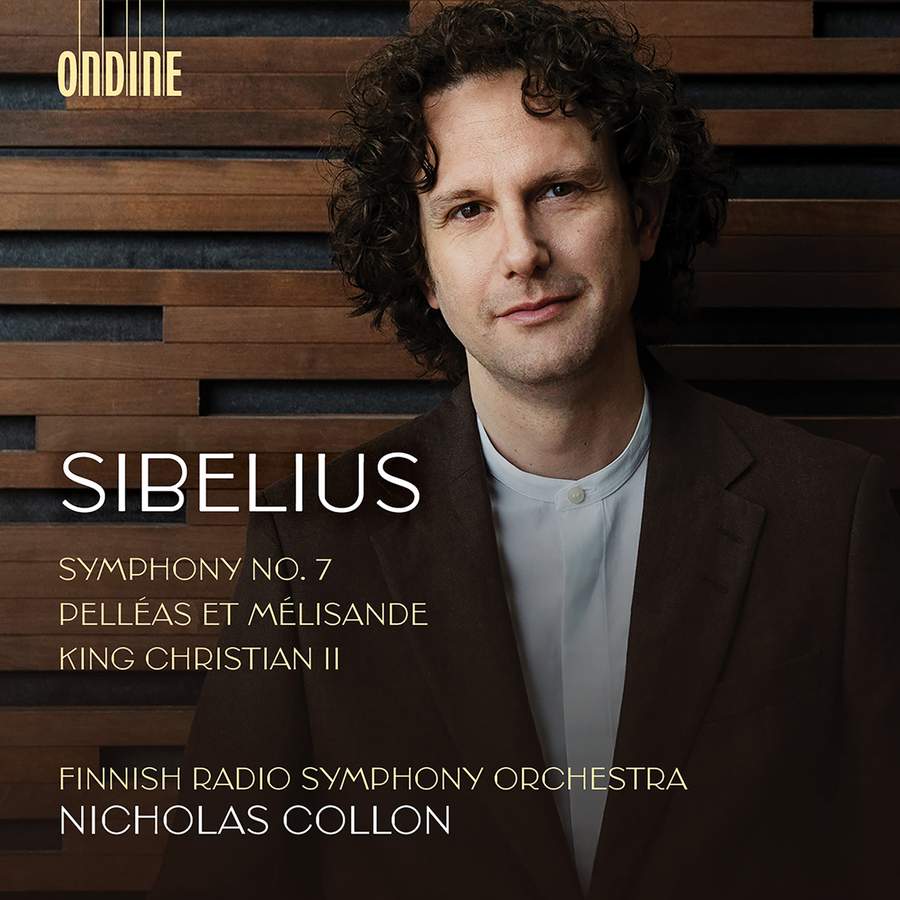SIBELIUS Symphony No. 7. Pelléas Et Mélisande. King Christian II (Collon)
View record and artist detailsRecord and Artist Details
Genre:
Orchestral
Label: Ondine
Magazine Review Date: 07/2022
Media Format: CD or Download
Media Runtime: 65
Mastering:
DDD
Catalogue Number: ODE1404-2

Tracks:
| Composition | Artist Credit |
|---|---|
| Symphony No. 7 |
Jean Sibelius, Composer
Finnish Radio Symphony Orchestra Nicholas Collon, Conductor |
| King Christian II |
Jean Sibelius, Composer
Finnish Radio Symphony Orchestra Nicholas Collon, Conductor |
| Pelleas and Melisande |
Jean Sibelius, Composer
Finnish Radio Symphony Orchestra Nicholas Collon, Conductor |
Author: Andrew Mellor
This is a rooted performance of Sibelius’s last symphony from the first non-Finn to lead the orchestra of the Finnish Broadcasting Company, one with true gravitas but little grandstanding. A touch more than the marginally slower Klaus Mäkelä on his recent Oslo recording (Decca, 4/22), Nicholas Collon has the symphony flowing like a deep river – perhaps something close to the river of lava long tapped in this score by Simon Rattle.
Everything is clear in Collon’s recording but the moving parts heave despite the sure momentum, giving the discourse a visceral edge. The slight burgeoning of each note in the trombone motto, which blossoms but is traced more than declaimed, is indicative of the bigger picture: careful, sure but unobtrusive phrasing that moves the music on while conveying, especially in the final pages, the wrenching strain that is the essential precursor to that final, pained C major. Laura Heikinheimo’s sound is ideal in conveying the sense of gravitational, inevitable progress.
The two sets of plaintive incidental music included here are astutely chosen. Don’t think of them as fillers, but continuations of the idea of passing states of mind and further examples of the composer’s concision and thrift. Sibelius was a master at setting the aural lighting for a scene or indeed an entire stage production. ‘Élégie’ from King Christian II and ‘The Death of Melisande’ from Pelleas and Melisande (an opaque response to Grieg’s ‘Death of Åse’) need a special tenderness and space and get it but there are numbers in which Collon sounds absorbed by Sibelius’s creation of miniature structural marvels. Rarely have I heard the ‘Nocturne’ from King Christian II come to fruition like a miniature Symphony No 2, nor its ‘Ballade’ sound like a little sister to Pohjola’s Daughter.
But this is theatre music and Collon sacrifices no greasepaint in his pursuit of structural logic. Perhaps it’s the cool finesse of the FRSO woodwinds, in particular, that succeed in drawing us into a sense of collective history in the old dances and old instruments (or imitations thereof) that characterise the music for King Christian II. It takes considered playing and extreme focus to reflect the ambiguities and fleeting emptiness of Pelleas. The broad bow strokes of ‘At the Castle Gate’, the steady withdrawal of ‘The Death of Melisande’ and the sinister lapping of ‘At the Seashore’ all speak of musicians well inside this music and determined to think patiently about its particular colours. Fine performances, yes, but also a comprehensive, watertight Sibelius album to cherish.
Discover the world's largest classical music catalogue with Presto Music.

Gramophone Digital Club
- Digital Edition
- Digital Archive
- Reviews Database
- Full website access
From £8.75 / month
Subscribe
Gramophone Full Club
- Print Edition
- Digital Edition
- Digital Archive
- Reviews Database
- Full website access
From £11.00 / month
Subscribe
If you are a library, university or other organisation that would be interested in an institutional subscription to Gramophone please click here for further information.




